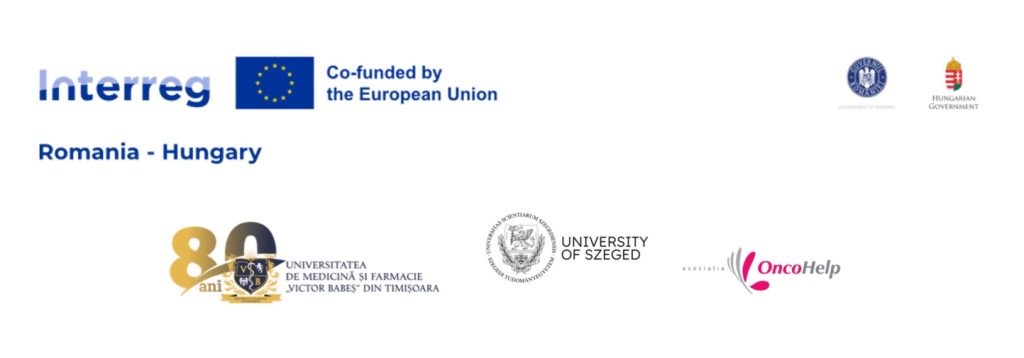METAGEN – A ROHU Cross-Border Innovation to Combat Antibiotic Resistance
Project Identification
- Project ID: ROHU00049
- Project Title: A ROHU cross-border innovation to combat antibiotic resistance while ensuring health equity and system resilience
- Lead Partner: “Victor Babeș” University of Medicine and Pharmacy from Timișoara (UMFVBT), Romania
- Partners:
– University of Szeged (SZTE), Hungary
– ONCOHELP Association, Romania - Programme Priority: P2 – Cooperation for a more social and cohesive partnership between Romania and Hungary
- Specific Objective: Ensuring equal access to healthcare and fostering the resilience of health systems, including primary care, while promoting the transition from institutional to community-based care
- Duration: 02.07.2025 – 01.01.2028
- Total Budget: €2,266,696.33
– EU (ERDF) contribution: €1,813,357.05 (80%)
Project team
- Project manager – Prof. Iulia Andreea Pînzaru
- Medical expert in public health – Prof. Sorin Ursoniu
- Medical expert in metagenomics – Prof. Ioan Ovidiu Sîrbu
- Medical expert in molecular diagnostic – Prof. Cătălin Valer Marian
- Pharmacist – Lect. Aimee-Rodica Chiș
- Medical expert in microbiology – Prof. Monica Sorina Licker
- Specialist in Clinical Laboratory (microbiology, hematology, biochemistry) – Prof. Delia Muntean
- Medical expert in bacteriology & virology – Assist. Corina Mușuroi
- Medical expert in bacteriology – Prof. Florin George Horhat
- Medical expert in microbiology – Lect. Iulia Cristina Bagiu
- Medical expert in microbiology – Assoc. Prof. Hogea Elena
- Financial manager – Ec. Mihaela Maria Stepan
- Procurement manager – Ec. Gabriela Cristina Ursan
- Assistant manager – Ioana Valeria Neațu
- Biologist, PhD student – Paula Ciordaș
- Pharmacist, PhD student – Mirabela Romanescu
- Medical doctor, PhD student – Izmendi Oana
Motivation and Contribution
The METAGEN Project fosters an innovative cross-border partnership between Romania and Hungary to combat antimicrobial resistance (AMR) — one of the most critical challenges in modern healthcare.
Led by the “Victor Babeș” University of Medicine and Pharmacy from Timișoara (UMFVBT), in collaboration with the University of Szeged (SZTE) and the ONCOHELP Association, the project aims to ensure equitable access to advanced diagnostics and to strengthen the resilience of health systems in the RO-HU border region.
Main Challenges Addressed
- Outdated microbiology diagnostic infrastructure in the region
- Limited experience in bacterial genome sequencing and inefficient control of hospital-acquired infections (HAIs)
- The growing public health threat posed by antimicrobial resistance
Innovative Solutions
To address these challenges, METAGEN introduces a state-of-the-art metagenomic approach using Oxford Nanopore Technology (ONT) — a third-generation sequencing method capable of real-time DNA/RNA analysis and pathogen identification within 24 hours.
Complementary advanced technologies include:
- Infrared (IR) Biotyping: Detects HAIs, resistance genes, and virulence factors in under 3 hours.
- LC-MS (Liquid Chromatography–Mass Spectrometry): Enables cost-effective measurement of antibiotic levels in patients’ blood.
Together, these tools empower healthcare institutions to perform faster, more precise diagnostics, guiding timely and targeted treatments.
Capacity Building and Knowledge Transfer
To reinforce local expertise and ensure long-term sustainability, the project will:
- Train 100 healthcare professionals (microbiologists and clinicians) in cutting-edge diagnostic techniques.
- Organize joint workshops and knowledge exchanges for 60 microbiologists and 40 clinicians from Romania and Hungary.
This collaborative framework strengthens cross-border capacity, ensuring that advancements continue well beyond the project’s duration.
Role and Main Activities in METAGEN
As Lead Partner, UMFVBT is responsible for the strategic coordination and implementation of the METAGEN project.
Project Coordination: UMFVBT oversees the project’s smooth execution, facilitating communication and alignment among all partners and ensuring timely achievement of objectives.
Knowledge Transfer: Drawing upon its extensive expertise in Nanopore sequencing and bioinformatics, UMFVBT provides technical and methodological guidance to the University of Szeged and ONCOHELP.
Data Collection: UMFVBT leads the collection of 3,200 biological specimens, forming the project’s central research dataset for antimicrobial resistance studies.
Training and Capacity Building
UMFVBT organizes:
- Three one-day theoretical training sessions (online/on-site) for 12 ROHU participants each.
- Practical workshops on Nanopore sequencing workflows.
- A professional dissemination event for laboratory specialists, residents, and clinicians, presenting key project findings and promoting innovative diagnostic workflows.
Resistance Gene Database: UMFVBT will establish a comprehensive Antimicrobial Resistance (AMR) Gene Database, serving as a long-term scientific resource for both research and clinical applications.
Project Management and Quality Assurance: Through its experienced Research and Grants Department, UMFVBT ensures that all project activities adhere to EU standards of transparency, accountability, and scientific excellence.
Impact
The METAGEN Project represents a major step forward in cross-border cooperation, public health innovation, and equitable healthcare access.
Expected Results
- Faster pathogen identification: Diagnostic times reduced from several days to less than 24 hours.
- Enhanced epidemiological surveillance: Real-time outbreak tracking via integrated Nanopore, IR Biotyping, and LC-MS platforms.
- Regional AMR Database: A shared Romania–Hungary platform for monitoring resistance genes and guiding evidence-based interventions.
- Improved healthcare equity: Broader access to modern molecular diagnostics for communities across both countries.
Added Value
METAGEN not only strengthens healthcare systems but also:
- Builds sustainable scientific capacity in advanced genomics and bioinformatics.
- Promotes cross-border knowledge exchange and shared medical standards.
- Contributes directly to EU objectives on health resilience and innovation.
Universitatea de Medicină și Farmacie „Victor Babeș” din Timișoara (UMFVBT) a lansat oficial proiectul METAGEN – “A ROHU cross-border innovation to combat antibiotic resistance while ensuring health equity and system resilience” (JEMS ID: ROHU00049), un demers de cercetare de frontieră finanțat prin Programul Interreg VI-A România–Ungaria (ROHU).
Evenimentul marchează începutul unei colaborări strategice între trei instituții de referință: UMFVBT (lider de parteneriat), Universitatea din Szeged (SZTE) și Asociația OncoHelp din Timișoara.
Într-un context global în care infecțiile multirezistente riscă să devină principala cauză de mortalitate până în 2050, METAGEN vine cu o abordare inovatoare: utilizarea metagenomicii pentru a descifra, în detaliu, ADN-ul microbian. Iar odată cu înființarea Metagenomic Reference Center la UMFVBT, Timișoara intră într-o nouă eră a cercetării de vârf, pentru întregul ecosistem medical care se pregătește să facă față provocărilor următoarelor decenii.

